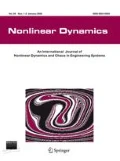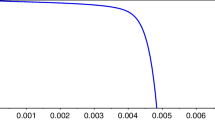Abstract
This paper concerns the problem of constructing \(C^1\) (continuously differentiable) controllers to stabilize a class of uncertain non-linear systems whose linearization around the origin may contain uncontrollable modes. Based on a new definition of homogeneity with monotone degrees, a polynomial Lyapunov function and a \(C^1\) global stabilizer are constructed recursively. Moreover, several special cases are investigated to show the advantages of the proposed approaches using the generalized homogeneity compared to the existing approaches using the traditional homogeneity.


Similar content being viewed by others
References
Bhat, S.P., Bernstein, D.S.: Continuous finite-time stabilization of the translational and rotational double integrators. IEEE Trans. Autom. Control 43(5), 678–682 (1998)
Brockett, R.W.: Asymptotic stability and feedback stabilization. In: Differential geometric control theory (Houghton, Mich., 1982), volume 27 of Progr. Math., pp. 181–191. Birkhäuser Boston, Boston, MA, (1983).
Byrnes, C.I., Isidori, A.: New results and examples in nonlinear feedback stabilization. Syst. Control Lett. 12(5), 437–442 (1989)
Cheong, S., Back, J., Shim, H., Seo, J.: Non-smooth feedback stabilizer for strict-feedback nonlinear systems not even linearizable at the origin. In Proceedings of 2005 American Control Conference, pp. 1907–1912, (2005).
Dayawansa, W., Martin, C., Knowles, G.: Asymptotic stabilization of a class of smooth two dimensional systems. SIAM J. Control Optim. 28(6), 1321–1349 (1990)
Du, H., Li, S.: Finite-time attitude stabilization for a spacecraft using homogeneous method. J. Guid. Control Dyn. 35(3), 740–748 (2012)
Du, H., Qian, C., Yang, S., Li, S.: Recursive design of finite-time convergent observers for a class of time-varying nonlinear systems. Automatica 49(2), 601–609 (2012)
Gendelman, O.V.: Nonlinear normal modes in homogeneous system with time delays. Nonlinear Dyn. 52(4), 367–376 (2008)
Haimo, V.: Finite time controllers. SIAM J. Control Optim. 24, 760–770 (1986)
Hong, Y.: Finite-time stabilization and stabilizability of a class of controllable systems. Syst. Control Lett. 46, 231–236 (2002)
Isidori, A.: Nonlinear Control Systems. Communications and Control Engineering Series, 3rd edn. Springer, Berlin (1995)
Kawski, M.: Homogeneous stabilizing feedback laws. Control Theory Adv. Technol. 6(4), 497–516 (1990)
Kokotovic, P.V., Freeman, R.: Robust Nonlinear Control Design: State-Space and Lyapunov Techniques. Springer, Berlin (1996)
Lin, W., Qian, C.: Adding one power integrator: a tool for global stabilization of high-order lower-triangular systems. Syst. Control Lett. 39(5), 339–351 (2000)
Lin, W., Qian, C.: Robust regulation of a chain of power integrators perturbed by a lower-triangular vector field. Int. J. Robust Nonlinear Control 10(5), 397–421 (2000)
Mahmoud, M.S.: Decentralized Systems with Design Constraints. Springer, Dordrecht (2011)
Marek, S., Stanislaw, W.: Application of joint coordinates and homogeneous transformations to modeling of vehicle dynamics. Nonlinear Dyn. 52(4), 377–393 (2008)
Polendo, J.: Global synthesis of highly nonlinear dynamic systems with limited and uncertain information. PhD thesis, University of Texas at San Antonio (2006).
Polendo, J., Qian, C.: A generalized homogeneous approach for global stabilization of inherently nonlinear systems via output feedback. Int. J. Robust Nonlinear Control 17(7), 605–629 (2007)
Polendo, J., Qian, C., Schrader, C.: Homogeneous domination and decentralized control problem for nonlinear system stabilization. In: Won, C., Schrader, C.B., Michel, A.N. (eds.) Advances in Statistical Control, Algebraic Systems Theory, and Dynamic Systems Characteristics, pp. 257–280. Birkhauser, Cambridge (2008)
Qian, C., Lin, W.: A continuous feedback approach to global strong stabilization of nonlinear systems. IEEE Trans. Autom. Control 46(7), 1061–1079 (2001)
Rosier, L.: Homogeneous lyapunov function for homogeneous continuous vector fields. Syst. Control Lett. 19(6), 467–473 (1992)
Rui, C., Reyhangolu, M., Kolmanovsky, I., Cho, S., McClamroch, H.N.: Non smooth stabilization of an underactuated unstable two degrees of freedom mechanical system. IEEE Conf. Control Decis. 4, 3998–4003 (1997)
Sun, H., Li, S., Sun, C.: Finite time integral sliding mode control of hypersonic vehicles. Nonlinear Dyn. 73(1), 229–244 (2013)
Acknowledgments
This work is supported in part by the U.S. National Science Foundation under Grant No. HRD-0932339, the Valero Research Excellence Award, the Natural Science Foundation of China (61074013), the Program for New Century Excellent Talents in University (NCET-10-0328), and the Science Foundation for Distinguished Young Scholars of Jiangsu Province (BK20130018).
Author information
Authors and Affiliations
Corresponding author
Appendix
Appendix
This appendix collects the proofs of the propositions used in the proof.
Proof of Proposition 1
The proof of this proposition will be separated into two different cases.
Case 1
If \({\frac{r_{i}p_{i-1}}{r_n+k_n}}\le 1\), applying Lemma 1 gives
On the other hand, we have
By the definitions of \(\rho \) and \(k_j\)’s, \(j=1,2,\cdots ,i\), one can tell that the power \(\frac{2\rho -k_{i-1}-r_{i-1}}{r_n+k_n}\ge 1\). Thus, we can apply the Mean Value Theorem to (48), then using Lemma 1 and by (9) one can obtain the following
where \(c'_i\) is a constant and \(\tilde{c}_i(x_1,\cdots ,x_i)\) is a positive function. With the help of (47) and (49), utilizing Lemma 2 and noting \(r_{i}p_{i-1}=r_{i-1}+k_{i-1}\), we have
where \(\underline{c}_{i}>0\) is a function.
Case 2
If \({\frac{r_{i}p_{i-1}}{r_n+k_n}}\ge 1\), applying the Mean Value Theorem yields and with a similar analysis as (49), we have
where \(\hat{c}_i\) is a positive constant and \(\check{c}_i(\cdot )\) is a positive function. With the relation \(r_{i}p_{i-1}=r_{i-1}+k_{i-1}\) in mind, putting (49) with (51) together and applying Lemma 2 yields
where \(\bar{c}_i(\cdot )>0\) is a function.
In conclusion, combining (50) and (52), we finish the proof of Proposition 1 as
by choosing \(c_i(\cdot )=\max \{\underline{c}_i(\cdot ),\bar{c}_i(\cdot )\}\).
Proof of Proposition 2
Denote \(\tilde{\beta }_j(x_1,\cdots ,x_j)\) \(= \beta _j^{\frac{r_n+k_n}{r_j+k_j}}\) \((x_1,\ldots ,x_j),~j=1,\ldots ,i-1\). By applying Lemma 1, Assumption 1 can be rewritten as
with a smooth function \(\tilde{b}_i(x_1,\cdots ,x_i)>0\).
With the help of (49) and Lemma , we know
where \(\check{b}_i(x_1,\cdots ,x_i)>0,~\hat{b}_i(x_1,\cdots ,x_i)>0\) are smooth functions.
Proof of Proposition 3
First, we will show that there exists a smooth function \(a_{i,l}(x_1,\cdots ,x_{i-1})>0\), such that the following holds
The proof is done by utilizing an inductive argument.
Initial step First we consider the case \(i=2\) and \(l=1\). With \(r_n+k_n\ge r_l\) in mind, by (9), (53), and applying Lemma 2, it yields
with smooth functions \(\check{a}_{2,1}(\cdot )>0,~\bar{a}_{2,1}(\cdot )>0\), \(\hat{a}_{2,1}(\cdot )>0\), and \(a_{2,1}(\cdot )>0\).
Inductive step Assume in step \(j-1\) that, for \(l=1,\cdots ,j-2\), there exists a smooth function \(a_{j-1,l}\) (\(x_l\), \(\cdots \), \(x_{j-2}\)) \(>0\) such that
In what follows, we show (54) will also hold for step \(j\), \(l=1,2,\cdots ,j-1\).
First for \(l=1,2,\cdots , j-2\), from (9) and (53), we have
where \(\tilde{\beta }_{j-1}(\cdot )=\beta _{j-1}^{\frac{r_n+k_n}{r_jp_{j-1}}}(\cdot )\). Noting that \(r_n+k_n\ge r_l\), using Lemma 2 together with (54), yields
where \(\bar{a}_{j,l}(x_1,\cdots ,x_{j-1})>0,~\hat{a}_{j,l} (x_1,\cdots ,x_{j-1})>0\), and \(a_{j,l}(x_1,\cdots ,x_{j-1})>0\) are smooth functions.
Next we shall prove (55) also holds in the case of \(l=j-1\). Similarly, using Lemma 2 together with (9) and (53), one can also obtain the following
where \(\bar{a}_{j,j-1}\) \((x_1,\cdots ,x_{j-1})\) \( >0\), \(\hat{a}_{j,j-1}\) \((x_1,\!\cdots \!,x_{j-1})\) \(>0\), and \(a_{j,j-1}(x_1,\cdots ,x_{j-1})>0\) are smooth functions.
In summary, the following holds for step \(j\) and \(l=1,2,\cdots ,j-1\)
This completes the inductive proof.
Final step Repeatedly using the inductive arguments, we can conclude that for the final step \(j=i\), there exists a smooth function \(a_{i,l}(x_1,\cdots ,x_{i-1})>0\), such that
With the help of (57), now we arrive at
with a smooth function \(\check{a}_{i,l}(\cdot )>0\).
Under the assumption of \(k_l\ge k_i\) \((\forall l=1,2,\cdots ,i-1)\), by utilizing Lemma 2, we have
where \(\tilde{a}_{i,l}(\cdot )>0\) is a smooth function. Finally, we can always find a smooth function \(\bar{b}_i(\cdot )>0\), such that Proposition 3 holds
Rights and permissions
About this article
Cite this article
Tian, W., Zhang, C., Qian, C. et al. Global stabilization of inherently non-linear systems using continuously differentiable controllers. Nonlinear Dyn 77, 739–752 (2014). https://doi.org/10.1007/s11071-014-1336-y
Received:
Accepted:
Published:
Issue Date:
DOI: https://doi.org/10.1007/s11071-014-1336-y



